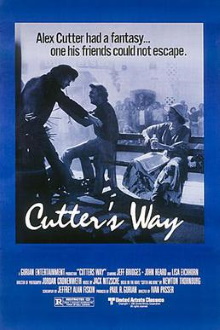I thought this film was a thriller but it’s really more of a psychological drama of a Vietnam War veteran’s weird ways of coping with his trauma. It’s a surprisingly more complex film that I expected yet the execution doesn’t quite live up to its full potential. This is the first film we’ve watched by director Ivan Passer but he was a close collaborator of fellow Czech Miloš Forman whose work we’ve loved. Imperfect as this film is, it seems to already be the pinnacle of Passer’s career so it’s doubtful that we’ll be watching more of his work.
Richard Bone, who is something of a layabout and a womanizer, has his car break down on a side late one night. He sees someone else pull up behind him and dump something but thinks nothing of it. The next day the police inform him that it was the corpse of a murdered young woman. Richard claims to not have been the man’s face and can’t help despite the entreaties of the dead girl’s sister. Yet later as he is attending a parade with his friend, the crippled veteran Alex Cutter, he recognizes local tycoon J.J. Cord. Richard is reluctant to do anything about his suspicion but Alex seizes on it and develops it into a big conspiracy theory. He contacts the dead girl’s sister, Valerie, and hatches a plan to blackmail Cord for money, hoping that Cord will incriminate himself if he pays up. Richard plays along for a while, perhaps out of friendship or sympathy for Alex’s disability, but backs off when Alex becomes too agitated and crazy.
The opening scenes of Bone accidentally witnessing a murder is a classic setup for a thriller but it turns out to be misleading as this film isn’t interested in being a thriller at all. It’s really a drama about Cutter and the abuse he inflicts on everyone around him as a result of his own pain. As a war veteran, he is missing an arm and a leg and constantly makes jokes in poor taste about his disability. It’s also about the strange ménage à trois with Cutter, Bone and Cutter’s wife Mo. Bone is hale and good looking, a Golden Boy who always hangs out around Cutter’s house and helps out, even as he and Mo are obviously attracted to one another. Cutter also receives support from Bone’s boss, who feels he owes a debt to Cutter’s mother. It’s possible that the reason Bone even has the job is so that he can be around to help Cutter with whatever he needs. The police aren’t involved in the plot at all and Cord is treated as some distant mysterious figure. Cutter claims that he is blackmailing Cord in the interests of justice and will give up the money but it is obvious that he is going to keep the money and he is angry at the whole world.
The director’s intent is probably to play up the ambiguity over whether Cord really is the murderer or if it is Cutter who is too caught up in his paranoid fantasies of a grand conspiracy. I don’t think it quite succeeds in that aim unfortunately. We need a little more background information on how the unusual relationship between Cutter and Bone got started. It’s also weird how Cutter quickly latches onto the plan of trying to blackmail Cord without even considering going to the police. Then there’s how the character of Valerie seems to disappear partway through the film even though she should be the one with the strongest motivation to find out what happened to her sister. The film is missing too many of the bits and pieces needed to make it work.
From what I understand the original novel that provided the source material wasn’t that noteworthy in the first place. Passer also complained that the studio didn’t organize preview audiences like they were supposed to which might have helped fine-tune the film and didn’t promote it. Or it may just be a cultural gulf problem of Passer not being able to completely grok Californian culture. Either way, this is the kind of film that feels like it could be good but doesn’t pull it off and I don’t think Passer ever made another film on his own that was as significant.
